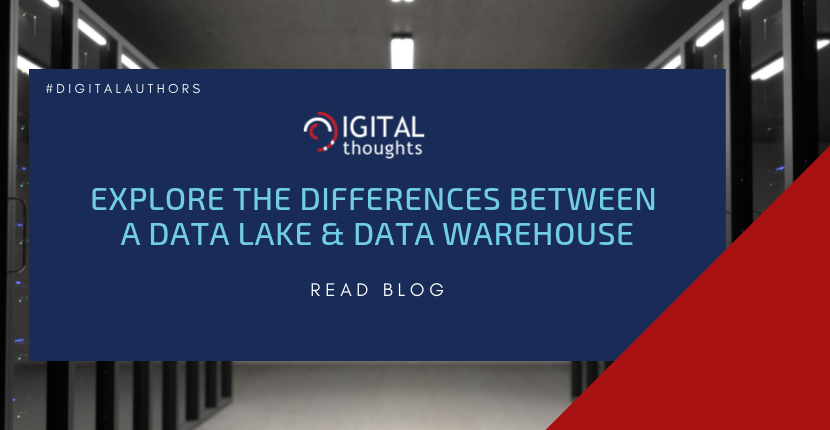Data Lakes vs Data Warehouses: Understanding the Difference

Data is growing at an unprecedented rate across the globe and it’s fast emerging as a challenge for enterprises. After all, the enterprise data is no stranger to this growth, as the information collected from various sources is increasingly becoming more and more difficult for the enterprises to manage, store and analyze. Picture this:
The volume of data created by U.S. companies alone each year is enough to fill ten thousand Libraries of Congress.
This finding by Big Data Made Simple indicates the extent to which enterprise data is growing. No wonder ‘Big Data’ is indeed the most apt term ever to describe this, as data is all set to rule the world.
Interestingly, the data that is in the possession of enterprises across the globe, is not in the optimized form as we see on the Web. It is largely unstructured and is in numerous different formats. So, you have images, emails, snippets, social media posts, pdfs, document files, spreadsheets, just name it and it’s there in this huge potpourri of enterprise data.
To cater to this issue of large volumes of data, enterprises are investing in different measures for storage, management and analysis. For its analysis, you have enterprise search tools equipped with advanced text mining capabilities. 3RDi Search is an enterprise search tool developed by The Digital Group that is designed as a comprehensive suite of text mining capabilities, including semantics, NLP and AI, to help you derive meaning and insights from even the most complex unstructured data. It’s a semantic search tool that offers a complete suite of text analysis capabilities for even the most complex unstructured data. For storing this data, you have data lakes and data warehouses – both of which are used by enterprises. However, is there is a different between the two? Also, which one should enterprises choose over the other? Let’s find out.
Both data lakes and data warehouses are used for storage. However, they are different when it comes to the structure, formats supported as well as the purposes served. Here are the key differences between the two, based on different parameters.
1] Definition
- Data Lake is defined as a collection of data that may be in any format – structured, semi-structured or unstructured – that can be used for any purpose.
- Data Warehouse is defined a repository of structured and processed information that is built with a specific purpose in mind.
2] Data Sourcing
- Data lakes capture structured, semi-structured as well as unstructured data from different sources, including non-traditional sources like sensors and logs, and stores them in the original format. The unstructured data needs to be analyzed using semantic search tools.
- Data warehouses capture structured information from traditional sources, like operational systems & applications, and creates schemas for systematic storage.
3] Expertise Required
- Data lakes require higher level of expertise when it comes to a user who wants to use it. This is because the data is unstructured and can only be analyzed by a data scientist (or someone with similar level of expertise) using advanced semantic search tools and other Big Data analysis tools.
- Data warehouses are relatively a lot easier to use, as the information is structured in a systematic manner. Can be easily used by most business users and analysts.
- Data lakes have a much higher capacity (at petabyte scale) and they store all data for indefinite time.
- Data warehouses have a lower capacity (at terabyte scale) and the data is also purged at regular intervals to make space for new information.
- Data Lakes use the Extract Load Transform (ELT) process.
- Data Warehouses use the Extract Transform Load (ETL) process.
- Data lakes are best used for Big Data analysis projects as well as Machine Learning models, because the data is available in raw and unstructured format.
- Data warehouses are best used for analyzing data from operational systems using Business Intelligence (BI) tools.
Conclusion
So, that was about the key differences between data lakes and data warehouses. Another point that might interest you, is that the use of Big Data technology in data lakes is relatively new as compared to data warehouses, with the latter having been around for decades. Also, there is nothing like one being superior to the other, as both of them are designed to serve different purposes in an organization’s data management plan.
